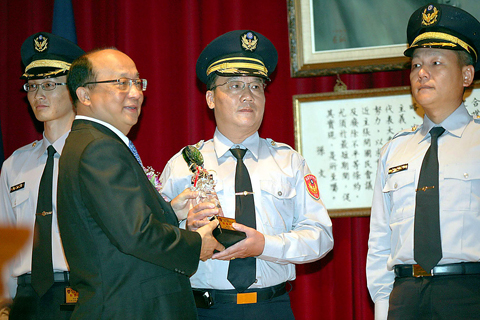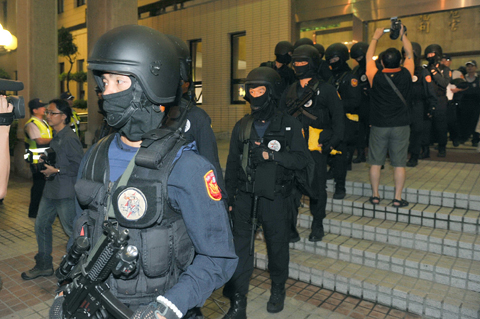Crime has become a major concern for Taichung Mayor Jason Hu (胡志強) ahead of the Nov. 27 mayoral election for Greater Taichung, with the city having become the center of a series of violent crimes in recent weeks.
While under normal circumstances the murder of alleged gangster Weng Chi-nan (翁奇楠) in his office last month would have been regarded as a regular homicide in Taichung or any other city in Taiwan, it turned into a scandal and soon became the object of public discussion after it was revealed that one retired and four active police officers were present at the scene of the crime, but did nothing to intervene.
A recent poll by the Chinese-language United Daily News showed that the recent crime wave in Taichung has had a negative impact on Hu’s popularity.

PHOTO: CHANG HSIEH-SHENG, TAIPEI TIMES
Hu said he would not disappoint his supporters.
“I will not be defeated by this crime problem,” he said.
Yang Yung-nane (楊永年), associate vice president for research and development at National Cheng Kung University, said that as Taichung is at the geographical center of the country, with convenient public transportation and a well-organized road system, people are understandably attracted to it — including underworld figures.

PHOTO: LIAO YAO-TUNG, TAIPEI TIMES
Hu acknowledged in September 2008 that the city has topped the entire country in terms of its crime rate for the past 15 years, with more than 5,000 crimes committed per 100,000 residents. According to the Taichung City Government Web site, the figure last year was 1,232 per 100,000 residents and 365.07 per 100,000 between January and April this year.
A former police officer, Yang said Taichung police had enough manpower when the Taiwan Province Government still existed, but since then, most officers have been transferred to other areas.
The city government’s Web site shows that Taichung has 2,486 police officers. On average, each officer is responsible for the safety of 412 citizens. Taipei City has 7,642 police officers, each responsible for the safety of 343 citizens, while Kaohsiung City has 4,303 police officers, each responsible for 352 citizens.
Yang said the special food chain between politics, police and the local hostess bar business — which is run by gang members — was a major problem, as was the fact that local politicians rely on gang members for financial help.
Police rely on politicians for their annual budgets, while gang members rely on a certain level of “tolerance” by police for their survival, he said.
“Crime in Taichung has been a problem for years,” he said. “The real problem behind crime is politics. How to fight such politics will be a major challenge for the mayor.”
A Taichung police officer said on condition of anonymity that hierarchical problems in the police force could be one of the reasons why the crime rate there remains higher than in other regions.
“Most Taichung officers are native [to Taichung]. However, most Taichung police chiefs were transferred from other bureaus or departments [in other parts of the country],” he said. “They cannot really understand what the local police are thinking because most get promoted and transferred to other positions within a few years.”
The officer said many of his coworkers felt frustrated whenever officers were accused of being connected with or having close ties to gang members.
“I don’t even know how to respond to this,” he said.
Sandy Yeh (葉毓蘭), an associate professor at Central Police University’s (CPU) department of foreign affairs, said the mayor should be more supportive of the police force.
“The mayor’s attitude toward the police is quite important. With his support, police will be able to enforce the law in the streets without hesitation,” Yeh said.
She said that having too many hostess bars in Taichung could be another major problem and that law-enforcement may not have sufficient resources to fight crime should the situation deteriorate.
Frank Huang (黃富源), an Examination Yuan member and an adjunct professor at the CPU’s department of crime prevention, agreed that the mayor’s attitude was key.
“Fixing the crime problem will require the participation of every resident. It’s not the responsibility of the mayor only,” he said. “That being said, the mayor should show his determination [to fight crime].”
Turning to the National Police Agency’s deployment of 41 SWAT team members to help maintain public order in Taichung, Huang said that while the move may help Hu’s re-election bid in the year-end election, it would not resolve the city’s crime problem for good.
“The problem involves society, culture, education and politics. We must fix them all,” Huang said. “The power of all the residents combined is much greater than that of the mayor alone. If Hu manages to make everybody care [about the problem], the crime rate will drop.”
Huang called on police to abide by stricter rules when it comes to having relationships with gang members.
“While police officers must come in contact with gang members for investigation purposes, they must also be taught how to protect themselves against potential lures while doing so,” Huang said.

Alain Robert, known as the "French Spider-Man," praised Alex Honnold as exceptionally well-prepared after the US climber completed a free solo ascent of Taipei 101 yesterday. Robert said Honnold's ascent of the 508m-tall skyscraper in just more than one-and-a-half hours without using safety ropes or equipment was a remarkable achievement. "This is my life," he said in an interview conducted in French, adding that he liked the feeling of being "on the edge of danger." The 63-year-old Frenchman climbed Taipei 101 using ropes in December 2004, taking about four hours to reach the top. On a one-to-10 scale of difficulty, Robert said Taipei 101

Taiwanese and US defense groups are collaborating to introduce deployable, semi-autonomous manufacturing systems for drones and components in a boost to the nation’s supply chain resilience. Taiwan’s G-Tech Optroelectronics Corp subsidiary GTOC and the US’ Aerkomm Inc on Friday announced an agreement with fellow US-based Firestorm Lab to adopt the latter’s xCell, a technology featuring 3D printers fitted in 6.1m container units. The systems enable aerial platforms and parts to be produced in high volumes from dispersed nodes capable of rapid redeployment, to minimize the risk of enemy strikes and to meet field requirements, they said. Firestorm chief technology officer Ian Muceus said

MORE FALL: An investigation into one of Xi’s key cronies, part of a broader ‘anti-corruption’ drive, indicates that he might have a deep distrust in the military, an expert said China’s latest military purge underscores systemic risks in its shift from collective leadership to sole rule under Chinese President Xi Jinping (習近平), and could disrupt its chain of command and military capabilities, a national security official said yesterday. If decisionmaking within the Chinese Communist Party has become “irrational” under one-man rule, the Taiwan Strait and the regional situation must be approached with extreme caution, given unforeseen risks, they added. The anonymous official made the remarks as China’s Central Military Commission Vice Chairman Zhang Youxia (張又俠) and Joint Staff Department Chief of Staff Liu Zhenli (劉振立) were reportedly being investigated for suspected “serious

Nipah virus infection is to be officially listed as a category 5 notifiable infectious disease in Taiwan in March, while clinical treatment guidelines are being formulated, the Centers for Disease Control (CDC) said yesterday. With Nipah infections being reported in other countries and considering its relatively high fatality rate, the centers on Jan. 16 announced that it would be listed as a notifiable infectious disease to bolster the nation’s systematic early warning system and increase public awareness, the CDC said. Bangladesh reported four fatal cases last year in separate districts, with three linked to raw date palm sap consumption, CDC Epidemic Intelligence